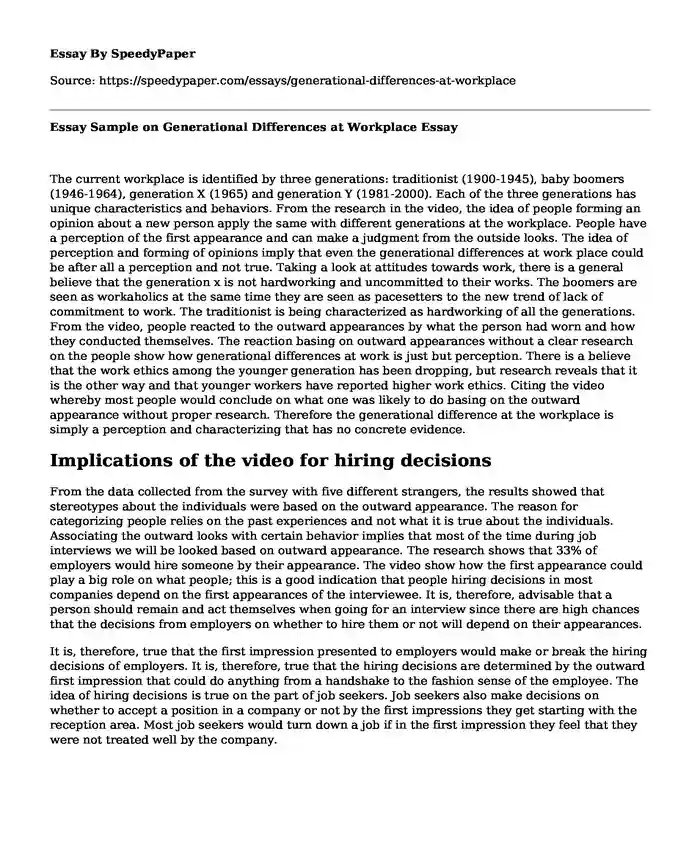
| Type of paper: | Essay |
| Categories: | Management Human resources |
| Pages: | 4 |
| Wordcount: | 852 words |
The current workplace is identified by three generations: traditionist (1900-1945), baby boomers (1946-1964), generation X (1965) and generation Y (1981-2000). Each of the three generations has unique characteristics and behaviors. From the research in the video, the idea of people forming an opinion about a new person apply the same with different generations at the workplace. People have a perception of the first appearance and can make a judgment from the outside looks. The idea of perception and forming of opinions imply that even the generational differences at work place could be after all a perception and not true. Taking a look at attitudes towards work, there is a general believe that the generation x is not hardworking and uncommitted to their works. The boomers are seen as workaholics at the same time they are seen as pacesetters to the new trend of lack of commitment to work. The traditionist is being characterized as hardworking of all the generations. From the video, people reacted to the outward appearances by what the person had worn and how they conducted themselves. The reaction basing on outward appearances without a clear research on the people show how generational differences at work is just but perception. There is a believe that the work ethics among the younger generation has been dropping, but research reveals that it is the other way and that younger workers have reported higher work ethics. Citing the video whereby most people would conclude on what one was likely to do basing on the outward appearance without proper research. Therefore the generational difference at the workplace is simply a perception and characterizing that has no concrete evidence.
Implications of the video for hiring decisions
From the data collected from the survey with five different strangers, the results showed that stereotypes about the individuals were based on the outward appearance. The reason for categorizing people relies on the past experiences and not what it is true about the individuals. Associating the outward looks with certain behavior implies that most of the time during job interviews we will be looked based on outward appearance. The research shows that 33% of employers would hire someone by their appearance. The video show how the first appearance could play a big role on what people; this is a good indication that people hiring decisions in most companies depend on the first appearances of the interviewee. It is, therefore, advisable that a person should remain and act themselves when going for an interview since there are high chances that the decisions from employers on whether to hire them or not will depend on their appearances.
It is, therefore, true that the first impression presented to employers would make or break the hiring decisions of employers. It is, therefore, true that the hiring decisions are determined by the outward first impression that could do anything from a handshake to the fashion sense of the employee. The idea of hiring decisions is true on the part of job seekers. Job seekers also make decisions on whether to accept a position in a company or not by the first impressions they get starting with the reception area. Most job seekers would turn down a job if in the first impression they feel that they were not treated well by the company.
How can organizations help managers increase the accuracy of their social perceptions?
The behavior of people in organizations could be influenced by fellow colleagues perceptions and attributions. Perceptions depict the way individuals channel, arrange and translate sensory information. Attribution clarifies how individuals act, deciding how individuals respond to the activities of others too. Accurate perception permits representatives to translate what they see and hear in the working environment so as to successfully decide, finish assignments and act in a moral way. Flawed recognitions prompt issues in the workplace, for example, stereotyping, that lead individuals are making assumptions that are wrong (Wagner III & Hollenbeck, 68).
Individuals in organizations will always feel unwelcomed when they are made through unfamiliar situations. Organizations, through competent professionalism, can spell out the benefits to all parties in the organization if they ensure everyone does not subject each other to inaccurate perceptions. Management should actively recognize every individual perceptions and attribution. For effective leadership, then the organization should state their reasons for their approach and seek for support form organizations stakeholders if they require their support. The organization should give their employers a chance to explaining their behavior. The organization should encourage managers not to be destructed by failures as a result of their decision making. People should be given a chance to make their decisions since there are high chances that individual performance will influence them. The management should not put the blame of those they are managing if they fail or get unlucky. The management social perception will improve if the manager ensures that they have recognized the cultural beliefs and the intentions of the people he or she leads in an organization.
Work Cited
Wagner III, J. A., & Hollenbeck, J. R. (2014). Organizational behavior: Securing competitive advantage. Routledge.
http://www.youtube.com/watch?v=EExkZW_fI68
Cite this page
Essay Sample on Generational Differences at Workplace. (2019, Nov 25). Retrieved from https://speedypaper.net/essays/generational-differences-at-workplace
Request Removal
If you are the original author of this essay and no longer wish to have it published on the SpeedyPaper website, please click below to request its removal:
- Career Goals Essay Samples
- Free Essay Sample: A Revolutionary Nation
- Dornase/Pulmozyme Essay Example for Everyone
- Research Paper Sample on Monopolistic Competition
- Free Paper: Corporate Social Activities of Wildlife Management Business
- Abuse in Concentration Camps during World War II, Essay Example
- Strategic Human Resource Management - Free Paper Sample
Popular categories




